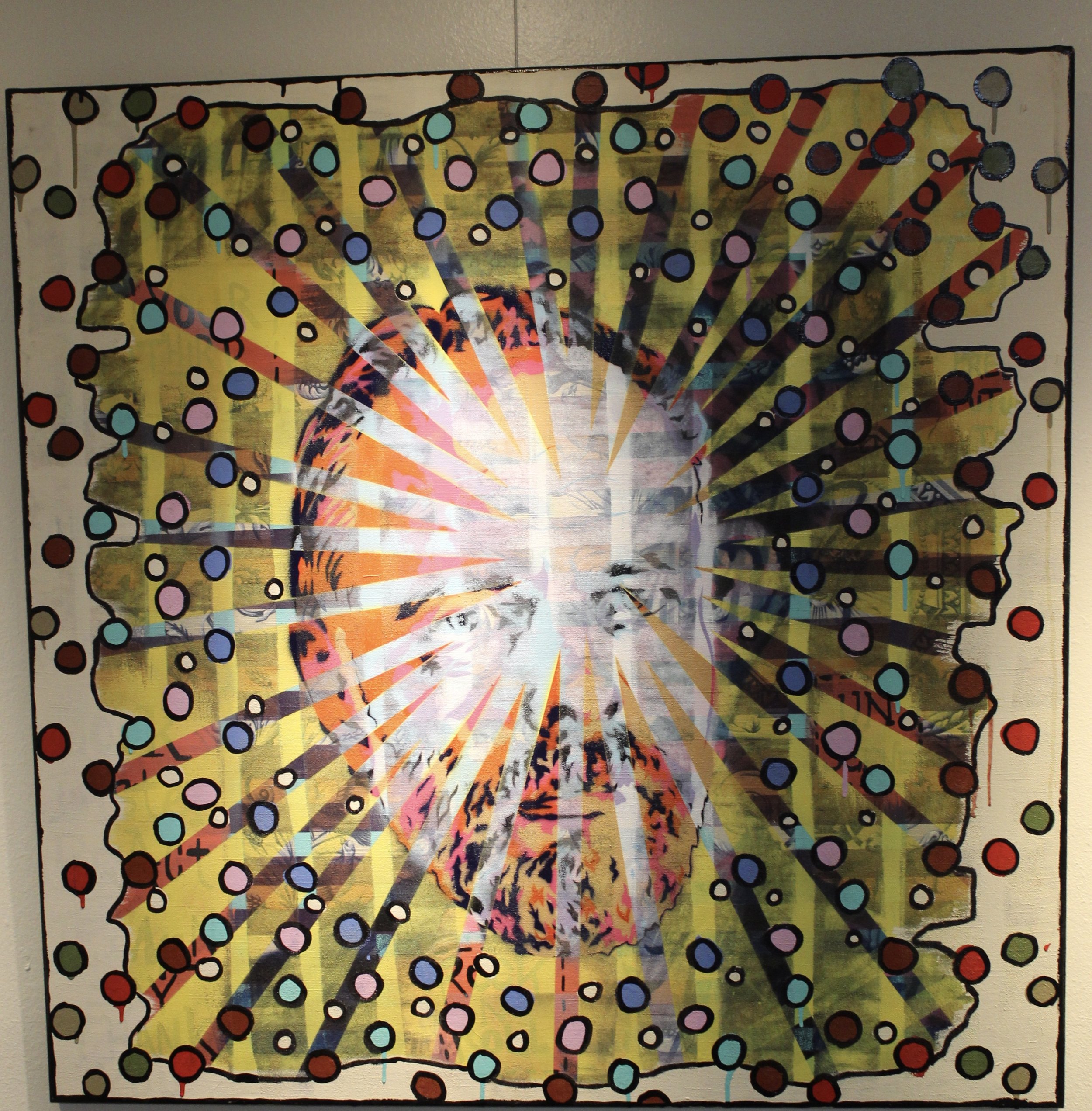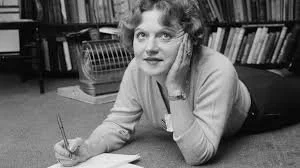Part 1: An Alternate-Reality Road Trip
On August 9, 2019 C. H. Lips and guest blogger, Jim Ringel, set out across the hot plains of eastern Colorado for the small town of Fort Morgan to enter into the alternate universe of the 2nd International Philip K. Dick Festival. We confess to arriving as PKD neophytes—Man in the High Castle is the only one of the 44 PKD novels we’ve both read. But we were in luck; the organizers chose that Hugo award-winning novel (his only Hugo win) as its focus for the festival’s talks and panels. We settled into chairs at the back of the Morgan Community College conference room as Lord Running Clam (a.k.a. Dave Hyde) gave opening remarks and welcomed us and the 20 or so veteran fans of all things PKD.
Philip K. Dick, buried beside his twin sister in Riverside Cemetery, Fort Morgan, CO.
But first, the question: Why Fort Morgan?
Dick was born in Chicago, lived mostly in California, and died in Santa Ana at the age of 53. But when he was six weeks old his father changed jobs and PKD, his parents and his twin sister set off across the country for the new job in San Francisco. They stopped over in Fort Morgan to stay with family and while there, PKD’s twin sister died. The Fort Morgan family had a plot in the local cemetery so Jane was buried there. Because they were twins, the headstone was also carved with Philip’s name and birthdate. In 1982, after passing away due to complications from two strokes, Dick’s father brought his ashes back to Colorado so the twins could rest side-by-side for eternity.
Favorite Literary Moments:
Jim Ringel: I thought we went back in time. Something about being in Fort Morgan. Something about it being a PKD festival. My favorite part of the weekend was hearing Nick Buchanan’s insight on PKD and the Craft of Writing. Nick led us through a line-by-line read of “Explorers We” (The Magazine of Fantasy and Science Fiction, 1959).
Nick gave numerous examples of Dick’s skill at writing with simple depth. Dick called it the ability to write brief sentences, one after the other, each “making the point neatly, and then exiting.” If you want to hear more about real pulp fiction minimalism, listen to Nick’s talk.
Another treat was Frank Hollander’s PKD Show & Tell session where we got to hold some true pulp fiction. I’m in my sixties. It’s been a while since I first drew kindergarten drawings on real, genuine manila paper with embedded wood pulp. It’s like going back in time. But I already mentioned that.
CH Lips: My favorite moments were any time the three men on Friday morning’s panel entitled: “THE MAN IN THE HIGH CASTLE: Phil’s First Masterpiece” allowed Tessa Dick, PKD’s fifth wife, to have the mike. I found her comments on her former husband’s work and personal life unexpected and fascinating. One of the other panelists was talking about how PKD relied heavily on the book, The Rise and Fall of the Third Reich, and Tessa added that PKD used to say that, in his opinion, the Nazis actually did win the war; the Nazi philosophies and methods were simply established by others—corporations, government authorities, not necessarily Germans—in other parts of the world where there were “expendable people” to exploit and subjugate.
Favorite Sci-fi Moments
CHL: Most definitely the Friday evening musical encomium at the gravesite by a guitarist who drove up from Denver in his white hearse. He set out his generator, amp and a couple of mute, headless, manikin backup singers and proceeded to jam. Check out Tessa Dick’s YouTube video (skip to 3:06) for the live action!
Paul Butler, performing under the name Redwing Blackbird, rocks the cemetery with his original tunes.
JR: Reading a good book is a visceral experience. That wasn’t quite my experience at the festival’s Skype presentation on The Music of PKD hosted by Sean Nye. Okay, so it’s music, and that led me to believe it would have something to do with sound. Except, after 15 minutes of futzing, they could only manage to get the picture of Sean, but not his voice. So then, as true science fiction fans, they tackled a simple problem with an unnecessarily complicated solution, accompanying the Skype video with a cell phone connection to hear Sean’s lecture, which was choppy and gurgled and basically delivered only every third word. I can’t tell you if there was any music played or not, but I didn’t hear any.
Favorite Take-away Moments
JR: As a writer, I am always interested in knowing how successful writers succeed. It’s usually nothing more than serendipity. Same for PKD.
He’d been writing fiction for over ten years when he won the Hugo for Man in the High Castle in 1963. Some say that Robert Heinlein’s Hugo win the year before for Stranger in a Strange Land left him without a completed manuscript to submit in 1963, which erased any real competition for Dick. However, please note that The Man in the High Castle did beat out Arthur C. Clarke’s 1963 submission, A Fall of Moondust.
CHL: The realization that the I Ching not only influenced the content of Man in the High Castle but was actually used by PKD constantly throughout the writing process to make decisions on plot and character. Frank Hollander, a member of Friday’s panel said the I Ching was the “animating force in the novel.” Tessa Dick said it was “the co-author” and that the I Ching let PKD down in the end—when he was nearing completion of the novel he began to become really angry with the answers the I Ching was giving. She said he asked the I Ching:
“Are you a liar?
Yes, the I Ching responded.
Are you the devil?
Yes.”
At that disturbing answer, PKD abandoned his muse.
We have ventured into the heart of PKD fandom. And though we have 43 novels and 121 short stories still left to read, we feel part of the clan and thoroughly justified in wearing our new buttons with pride:
Button sold at the PKD 2019 Festival art exhibit.
Craving a further PKD fandom foray? Check out Dave Hyde’s website.
Part 2: Mark Springer revisits Do Androids Dream of Electric Sheep?
Sadly, I didn’t make it to the Philip K. Dick festival in Fort Morgan. Nonetheless, I happily rearranged my late-summer to-do list to make room for a long-overdue re-reading of Do Androids Dream of Electric Sheep?. The novel, probably best known as the inspiration for Ridley Scott’s cult classic SF masterpiece, Blade Runner, was my first encounter with PKD. It was also an early lesson in how the process of adapting a story from page to screen is more a reimagining of the source material than a literal translation. Except for the basic premise and some character details, Blade Runner is no more beholden to Androids than Alex Garland’s adaption of Annihilation is to Jeff VanderMeer’s novel of the same name. Which is to say, if you’ve seen the film but haven’t read the book, you’re missing out—and vice versa.
I discovered of PKD and Androids when I was in middle school, by way of a late-night viewing of Blade Runner at a friend’s house. I remember feeling almost desperate to get my hands on the book. I read it in a day. This time around it took me two days, but only because adulthood and dad life demand at least a few concessions to reality.
Not that reality is particularly deserving of concession in a PKD story. Roger Zelazny puts it best in a characteristically wisecracking essay that accompanies the Del Ray edition of Androids:
“The worlds through which Philip Dick’s characters move are subject to cancellation or revision without notice. Reality is approximately as dependable as a politician’s promise. Whether it is a drug, a time-warp, a machine, or an alien entity responsible for the bewildering shifting of situations about his people, the result is the same. Reality, of the capital ‘R’ variety, has become as relative a thing as the dryness of our respective Martinis. Yet the struggle goes on, the fight continues.”
So it is for Rick Deckard, the noir-ish hero of Androids. In the novel, Deckard is a bounty hunter working for the San Francisco Police Department. His job is to track down and “retire” rogue androids that illegally return to Earth from Mars or elsewhere in the solar system. It’s not that humans are trying to keep Earth to themselves, lest the cradle of civilization become overrun by sentient artificial lifeforms. Quite the opposite: the planet is a ruined, dust-choked shell of its former glory, the biosphere poisoned by radioactive fallout from World War Terminus. Most animal species have gone extinct, and most humans have fled to Mars and other off-planet colonies. To alleviate the physical hardships of colonizing the solar system, corporations have developed androids to serve the colonists. This is chattel slavery all over again—but only if you see the “andys” as sentient life forms deserving of empathy and the same rights as humans. Interplanetary law most definitely doesn’t see them that way, and neither do their human masters. Thus, when an andy goes rogue to escape enslavement, its only hope for freedom is to journey to Earth, where it might be able to live undetected among the sparsely populated ruins of the planet’s few remaining urban centers.
Blade Runner is amazing, but if you haven’t read the book that inspired it, then you’re missing out.
Enter Deckard, who is given an impossible assignment: to track down not one, not two, but six Nexus-6 androids—the most intelligent, most human-like, most dangerous andys yet built. The Nexus-6 model is almost indistinguishable from humans, except for subtle physiological reactions that, when properly tested, reveal an android’s lack of empathy. Before he can legally retire an andy, Deckard must administer an empathy test to identify his target as non-human. The problem is, the Nexus-6 is so advanced that it might be able to pass the empathy test. Does that mean andys have developed true empathy, or just a good enough simulation to fool the test? What’s the difference between the real thing and a simulation good enough to pass as the real thing anyway? And if androids have developed empathy, does that make them alive? Does it make them … human?
The novel revels in these philosophical questions, further complicating them with religious, ecological and metaphysical themes as Deckard doggedly pursues the rogue Nexus-6 androids, despite mounting danger. Each encounter with a Nexus-6 causes Deckard to question not only his own empathy (and therefore his humanity) but also the assumptions that make the practice of retiring andys seem like a good and necessary thing. It all adds up to a perfect slow burn of post-apocalyptic melancholy and self-doubt. In Do Androids Dream of Electric Sheep?, as in so many of his other works, PKD’s anxieties about technology, the nature of humanity and our relationship with the natural world are as relevant today as they were fifty years ago—and likely just as prescient to the next fifty years. Assuming we don’t cancel ourselves in the meantime.
Guest Contributor Byline
Jim Ringel is the award-winning author of 49 Buddhas: Lama Rinzen in the Hell Realm, the first in his Buddhist detective series. You can follow Jim on his blog at jimringel.com and WritingLikeaBuddha.com.
















Cadwell Turnbull's new novel — the first in a trilogy — imagines the hard, uncertain work of a fantastical justice.